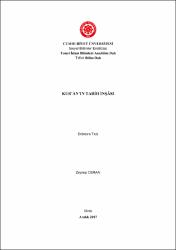| dc.contributor.advisor | Keskin, Hasan | |
| dc.contributor.author | Ceran, Zeynep | |
| dc.date.accessioned | 2022-04-28T09:13:37Z | |
| dc.date.available | 2022-04-28T09:13:37Z | |
| dc.date.issued | 2017 | tr |
| dc.date.submitted | 2017-12-22 | |
| dc.identifier.other | IX, 333 sayfa | |
| dc.identifier.uri | https://hdl.handle.net/20.500.12418/12562 | |
| dc.description.abstract | Bu çalışmamızda Kur’an’ın zaman mefhumuna yüklediği anlamı ve bu anlam doğrultusunda muhatapların zihninde oluşturmayı hedeflediği tarih tasavvurunu tahlil ettik. Bunun için öncelikle tarih felsefesinde esas kabul edilen sorunsalları belirledik ve Kur’an’ın tarih anlayışı ile farklı düşünce sistemlerinin anlayışlarını bu sorunsallar çerçevesinde karşılaştırdık. Böylece Kur’an’ın farklı düşünsel yapılarla ve kültürlerle benzeşen ve ayrılan yönlerini belirleyerek Kur’an’ın özgün tarih anlayışının sınırlarını ve ilkelerini ortaya koyduk. Bunu yaparken farklı düşünce sistemlerinin tarih anlayışları hakkında doğrudan veya dolaylı bilgiler veren kaynaklarla, Kur’an ayetlerine çeşitli açılardan yorumlar getiren klasik ve modern dönem tefsirlerinden faydalandık.
Çalışmamızın en temel amacı pek çok farklı okumaya tabi tutulabilecek Kur’an ayetlerine, geçmiş, şimdi ve gelecek perspektifinden hareketle yeni bir açıdan yaklaşmaktır. Bu okumayla Kur’an’ın, insan varlığının kendisini gerçekleştirdiği bu üç farklı zaman diliminde muhataplarının zihnini ve davranışlarını nasıl yönlendirdiğini ortaya koymayı hedefledik.
Araştırmamızda Kur’an’ın, tarih anlayışı konusunda farklı düşünce sistemleriyle birtakım ortak noktalarda buluşmakla birlikte, kendi özgün tasavvurunu geliştirdiği sonucuna ulaştık. Onun özellikle zaman mefhumuna yüklediği bütünsel anlam noktasında diğer sistemlerden tamamen ayrıldığını farkettik. Düşünce sistemlerinin gerek kendi aralarında gerekse Kur’an ile uzlaştıkları noktalar ise bizi, Kur’an öncesi vahyin farklı coğrafyalarda bıraktığı izlere ve kültürlerarası etkileşime götürdü. Bu ortak noktalar aynı zamanda hangi dönem ve coğrafyada yaşamış olursa olsun, insan zihninin büyük oranda aynı düşünsel parametrelerle yol aldığını göstermesi açısından büyük önem taşımaktadır. Bu sebepledir ki Kur’an, tarih anlayışı konusunda muhatapların zihnini inşa ederken ortak duygu ve düşünce süreçlerini esas alan bir yöntem izlemiştir. | tr |
| dc.description.abstract | In our thesis, we analysed the mean given by Qoran to the concept of time and the history imegination which Qoran aimed to construct in its listeners’ minds according to this mean. For this purpose, firstly, we determined the basic problematics of historical philosophy, then compared the different history approaches of Qoran and other thinking systems, in the frame of these problematics. So, we determined the borders and principles of Qoranic historical approach by finding the different and common points between Qoran and other thinking systems or cultures. We referred to some sources which give direct or indirect information about historical approaches belonged to different thinking systems. Besides that we referred to some tafsir sources written in classical and modern era, which evaluate Qoranic verses from variable aspects.
Main purpose of our thesis is evaluating Qoranic verses with a different aspect from the perspective of past, present and future. With this manner of reading, we aimed to find out how Qoran directs its listeners’ minds and behaviours in these three sections of time, in which human being realizes itself.
In our research we found out that although Qoran shares some common on historical approach points with other thinking systems, it developed its own history idea. It differs from other systems completely, especially about the whole mean which it gives to the concept of time. The common points, on which thinking systems agree to Qoran, led us to consider that there were some traces of divine inspiration before Qoran, in different territories. Besides, there were a kind of interaction between cultures. These common points are also very important for the wiew of that it shows whereever and whenever he lives, human intellect developes according to almost the same mental parameters. Fort his reason, when constructing its listeners’ mentality, Qoran used a method based on common emotional and mental process a among human beings. | tr |
| dc.language.iso | tur | tr |
| dc.publisher | Sivas Cumhuriyet Üniversitesi-Sosyal Bilimler Enstitüsü | tr |
| dc.rights | info:eu-repo/semantics/openAccess | tr |
| dc.subject | Kur’an | tr |
| dc.subject | İnşâ | tr |
| dc.subject | Tarih Tasavvuru | tr |
| dc.subject | Tarih Felsefesi | tr |
| dc.subject | Zaman | tr |
| dc.subject | Varlık | tr |
| dc.title | Kur'an'ın Tarih İnşâsı | tr |
| dc.type | doctoralThesis | tr |
| dc.contributor.department | Sosyal Bilimler Enstitüsü | tr |
| dc.relation.publicationcategory | Tez | tr |















